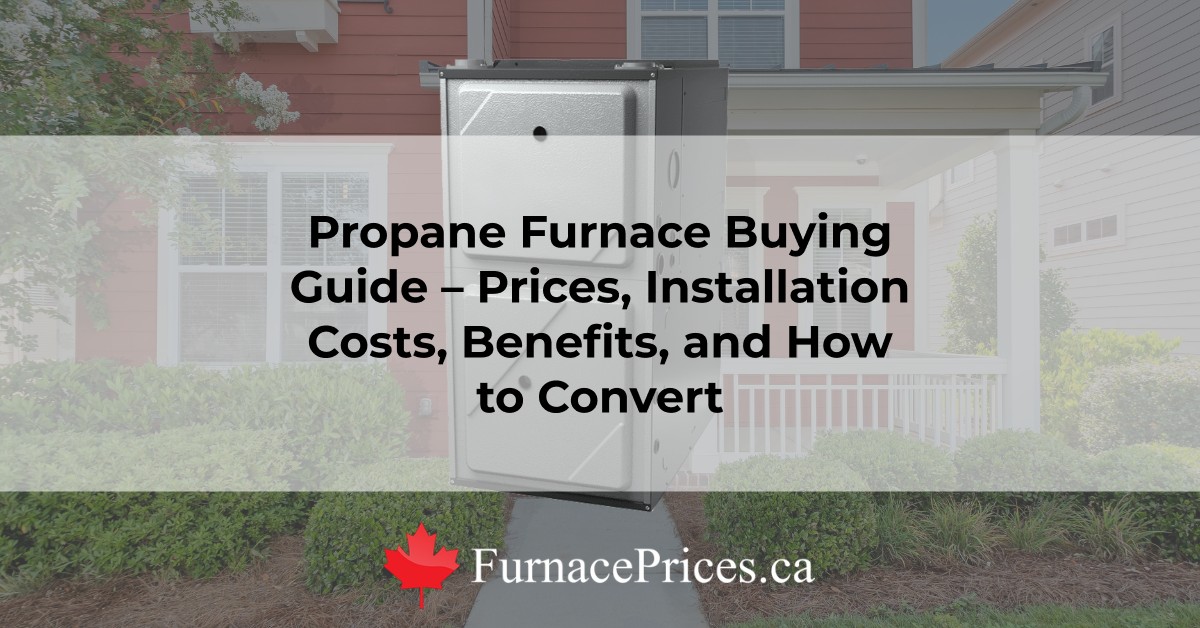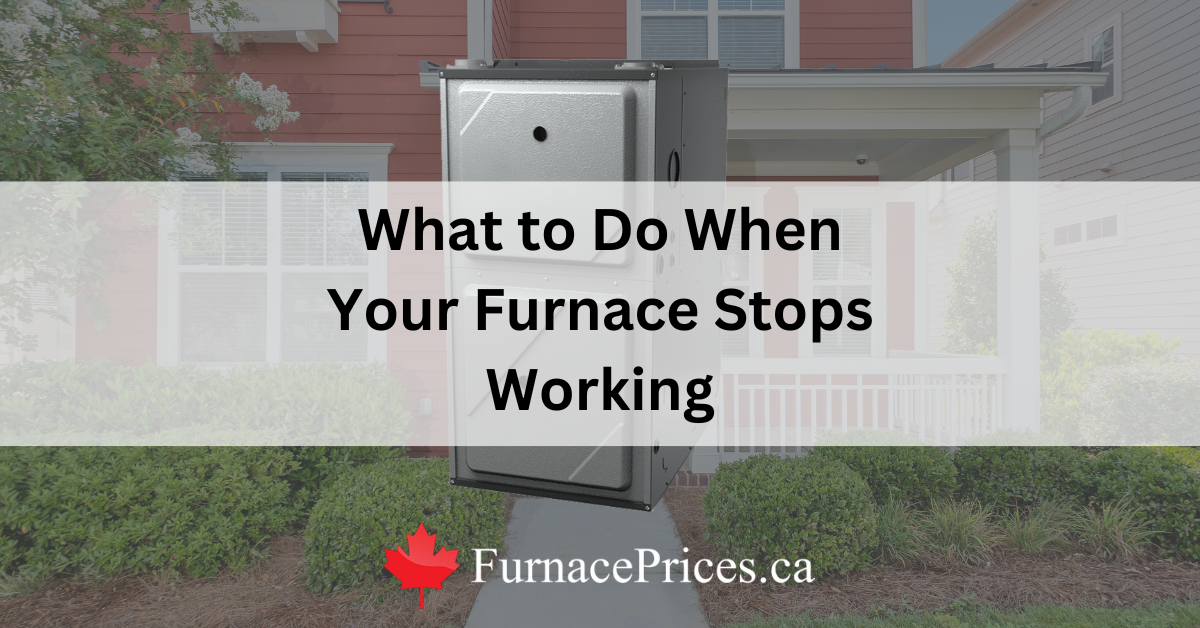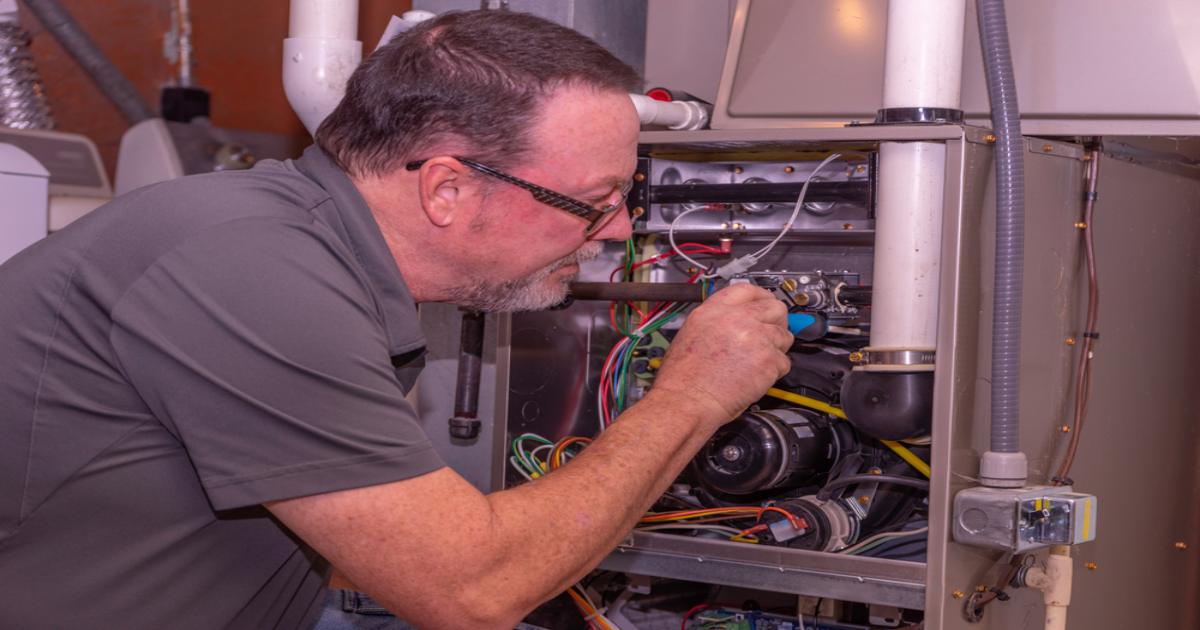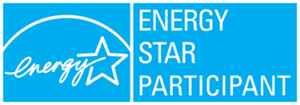What's covered in this article?
Toggle
Oil and electric furnaces are still popular in some parts of Canada, but they have their drawbacks. Fortunately, you can convert a furnace from oil/electric to propane/natural gas.
Propane and natural gas furnaces are by and large cheaper to operate than electric and oil powered furnaces, especially if you opt for a high-efficiency furnace with a AFUE above 90%.
If you want to convert an oil furnace to gas/propane or convert an electric furnace, this article will tell you what you need to know.
The Benefits of Converting a Furnace to Propane or Natural Gas
- Improved efficiency and reduced environmental impact. Propane and natural gas furnaces tend to operate at a significantly higher AFUE than oil furnaces, meaning they convert more of the fuel to usable heat. This means less waste and fewer harmful emissions.
- Pay as you go & equalized payments. Many oil suppliers may charge upfront for a tank refill, whereas most natural gas utilities will charge you on a monthly or bi-monthly basis for what you use. Many also offer the option to spread the payments out in equal and predictable amounts so there are no surprises.
- Increased home value. A new modern propane or gas heating system is more efficient, affordable, and heats more effectively than oil. This makes it a more attractive option for potential home buyers and is a great all-around investment.
Other Benefits & Reasons to Consider Converting a Furnace
- Space savings – The most immediate benefit of when you convert a furnace is the space you will save. New propane and gas furnaces tend to be more compact and take up less space in your home than older oil furnaces.
- Propane and gas are also much cheaper than electric and oil heating. These furnaces are generally cheaper to operate than electric and oil furnaces, since electricity far more expensive, while oil is also fairly expensive and is burned far less efficiently. Gas and propane furnaces also require comparatively little electricity (usually only for parts like the blower). Propane and gas also burn hotter than electric furnaces and more completely than oil and can operate in short intervals so that they are not always running, thus saving you more money.
- Rebates – The Canadian and your provincial government often offer incentives and rebates for switching from oil to a new high-efficiency furnace.
- Natural gas vs propane – Natural gas is a great alternative to both oil and electrical furnaces, and even propane furnaces if you live in an urban area where gas lines can be easily hooked up to the local supply. Natural gas is very economical and costs about a third less than even propane.
- Constant supply – When you convert a furnace to natural gas, you no longer have to worry about refilling tanks. Unlike oil (and propane) furnaces that need a tank of regularly replenished fuel, natural gas furnaces run off of the municipal supply.
Choosing Between Propane and Natural Gas
In most urban and suburban areas, natural gas is readily available and the infrastructure is already in place. Conversely, many people don’t have space to house a propane tank on their property.
In rural areas, on the other hand, it’s possible that natural gas might not be an option because there’s no infrastructure, and propane may be your only choice.
If you’re able to choose, here are some things to consider:
- You’ll need to have your propane tank inspected regularly
- Propane is more efficient than natural gas
- Natural gas is more affordable than propane
- Propane burns cleaner than natural gas
- Natural gas doesn’t require a storage tank or regular delivery
How to Convert a Furnace: Process & Important Considerations
There are different processes involved depending on which kind of furnace you are converting from but overall, the benefits of converting a furnace from oil or electric heating are many. Take a look at the following breakdown of the process so you can get a better handle on what may be involved.
Get Quotes
How soon are you looking to buy?*



1) What is your current heating system?
- Converting from an Existing Forced-Air System – If you’re converting a furnace but already have a forced air oil/electric system in place, the process will be much easier. If you are unsure of what kind of system you have, you can contact a local contractor to let you know. In this case, the cost mostly amounts to the cost of the new furnace itself, plus a bit more than usual for the installation. In total, you might expect to spend $3500 – $8000 to switch from an oil or electric forced air furnace to a high-efficiency propane or natural gas system.
- Converting from Electric Baseboard Heating or a Boiler System – In this case, your home most likely doesn’t have any ductwork, which makes the switch much more complicated and costly. Installing ductwork throughout your house is a big job, and usually requires a heat-loss calculation be done by an engineer (costs about $500 – 800) in order to determine where the heating ducts will go. Then a contractor must install all the ducts and venting, before the furnace can be installed. Think carefully about whether this type of conversion is worth all the expense, as it can easily run well over $10,000 when all is said and done. Alternatively, you may be able to install ductless mini-split heat pump units instead.
2) What heat are you converting a furnace to?
- Converting to Natural Gas – Natural gas powered furnaces are the most common type in Canada. Many people opt to run natural gas to heat their homes because it is more economical and tends to require less work. If you do want to convert a furnace to natural gas, you should start by getting in touch with the local gas company. The process is usually easy and involves running an extension from the main line in your neighbourhood to your home and furnace. Most gas utility companies will cover this cost, provided the infrastructure is already present in your neighbourhood.
- Converting to Propane – One of the main reasons that people choose propane to fuel their furnaces is that they live in rural areas where natural gas infrastructure is not available. Propane tends to be more expensive than natural gas (about 60 cents – $1.20 per litre) and there needs to be a large tank installed either on the side of the house or underground to house the fuel.
Hiring a Professional: Importance of Proper Installation and Conversion

There are tons of reasons to hire a licensed HVAC pro to convert a furnace, and above all is safety.
You need to be sure an oil tank is removed without spills, that gas lines are hooked up without leaks, and that your furnace is installed properly to avoid carbon monoxide poisoning and fire hazards.
But safety isn’t the only thing to think about. Here are other reasons it’s a good idea to hire a pro:
- Compliance with local building codes and regulations
- Converting a furnace involves technical knowledge of each system’s mechanical and electrical components
- Specialized tools and equipment may be required
- Making sure your furnace is compatible with the fuel type you want
- Sizing your new furnace correctly for your home
- Many furnace manufacturers require that installations and conversions be performed by licensed professionals to maintain warranties
- Many HVAC companies offer additional warranties when they install the furnace
- Making sure the system is optimized for the most efficient performance
Cost Considerations: Budgeting for Furnace Conversion Expenses

These are some of the most common costs associated with converting a furnace from gas/electricity to natural gas or propane:
- New thermostat
- New furnace
- Labour and installation
- Materials
- Modifications to ductwork
- Additional ventilation
- Permits
- Installing the fuel lines
- Propane tank and fill
- Removal and disposal of the old furnace
How much does it cost to convert a furnace from oil/electricity to gas?
The average cost to convert a furnace to natural gas or propane in Canada can range anywhere from $5,000 to $15,000.
However, you can expect to see immediate savings on your heating bills to offset the cost of converting a furnace.
In fact, some estimates suggest you could save as much as $1,500 or more a year on fuel costs if you convert a furnace from oil/electricity to propane or natural gas.
Check for rebates that might help with the cost, especially if you’re converting from an oil furnace.
Where to Start
In any case, the best place to start is by calling your local gas company and finding out which options are available to you. If you do have an electrical heater that depends on baseboards or sub-floor radiators, the process will be more expensive, invasive and time-consuming since a contractor will need to install ductwork.
Once you have made the decision to convert a furnace to propane or natural gas, it is very important to have a professional come out to your home and conduct a free estimate to assess your needs and provide an accurate cost.
Based on the square footage of your home, its insulation and the number of rooms you have in it, this will determine the correct size and BTU output of furnace you will need to sufficiently warm your home.
Most likely, the process will start with having the gas utility company run a line to the main (for natural gas) or a propane company installing a tank on your property either above or below ground.
Afterwards, you can request free in-home estimates from local distributors and contractors simply by filling out the form on this website.
Steps Involved to Convert a Furnace
The first step when you want to convert a furnace is to choose a licensed HVAC professional to do the job. Don’t be afraid to get multiple quotes from various companies.
Once you choose a professional to work with, they’ll be able to walk you through the process and help you choose a new heating system for your home. That includes assessing available fuel alternatives and deciding between propane or natural gas.
From there, the HVAC pro can help you evaluate your ductwork to see if any upgrades are needed.
The gas lines must also be installed, and if you’ve opted for propane, the tank must be installed and hooked up.
The next step is removing the existing equipment, including the oil tank if you have oil heating. Once the old furnace is gone and the new/upgraded infrastructure is in place, your new furnace can be installed and fine-tuned.
Safety Considerations: Ensuring Proper Ventilation and Leak Detection
Modern furnaces have many safety features, but dangers still exist.
Natural gas and propane furnaces produce carbon monoxide, and proper ventilation stops it from accumulating indoors and causing poor indoor air quality and potentially carbon monoxide poisoning.
What’s more, gas leaks can happen, which can lead to explosions. Ensuring that gas lines are properly maintained and that any leaks are detected early minimizes this risk.
This is another reason professional installation is so important. A trained HVAC pro will make sure your furnace is properly ventilated, that exhaust gasses are exiting the house, and that the gas lines are hooked up properly.
They can also talk to you about the importance of having carbon monoxide detectors in the home, even if your furnace has a built-in gas leak detector.
Environmental Impact: Exploring the Eco-Friendly Aspects of Conversion
Converting a furnace from oil to natural gas or propane has many environmental benefits, including:
- No more risk of oil leaks on the property (a very small amount of oil can contaminate a lot of soil or water)
- Oil produces much higher carbon dioxide emissions, contributing to air pollution
- Oil combustion also emits other harmful pollutants, including nitrogen oxides and sulfur dioxide
- Natural gas and propane have far lower greenhouse gas emissions
- Better indoor air quality
- Improved efficiency and lower fuel requirements
Maintenance and Long-Term Care: Ensuring Optimal Performance After Conversion

After you convert a furnace to gas or propane, you still have to take care of regular maintenance. This will keep your furnace working at peak efficiency for as long as possible.
One of the most important things you can do to ensure the longevity of your new furnace is to have it inspected and serviced annually by a licensed HVAC technician.
You should also change or clean the filter every one to three months for efficiency and improved air quality.
Finally, you can also clean the major components annually, including the blower motor, heat exchanger, burner, flame sensor, and vents.
Conclusion: Enjoying the Benefits of a Converted Furnace
Converting a furnace from oil/electricity to natural gas or propane is an investment, but it can have many benefits, including lower energy bills, improved air quality, lower environmental impact, more predictable heating bills, lower home insurance premiums, and higher home value.
When you’re ready, contact experienced local HVAC companies for quotes. The right technician will help you every step of the way, including with removal and installation, gas line hookups, safety, finding rebates, and getting the best warranty protection.
FAQ
Can an oil furnace be converted to natural gas and is it worth it to convert a furnace?
Some oil furnaces can be converted to natural gas or propane with a conversion kit. Only a licensed HVAC pro should perform the conversion. If your oil furnace is 10 to 15 years old, damaged, or requiring repairs, it’s not likely worth the cost to convert it, and you’re probably better off replacing it.
Can I convert my oil heating to natural gas or propane?
In many places, it is possible and likely beneficial to convert your oil heating system to natural gas or propane.
However, there are some places in Canada where you’re not allowed to convert a furnace from one fossil fuel to another. In Quebec, for example, you can’t convert from oil to propane or natural gas—you would have to switch to electric heating, such as a heat pump.
An experienced HVAC professional in your area will know about potential restrictions and help you make the right choice for your heating system upgrade.
Related Posts
-
Propane furnaces are a great high-efficiency heating solution for Canadians who live outside of major…
-
During the winter months, your furnace is one of the most important home appliances that…
-
When it's frigid outside, during the worst winter can throw at us, the last thing…
Get Quotes
How soon are you looking to buy?*






